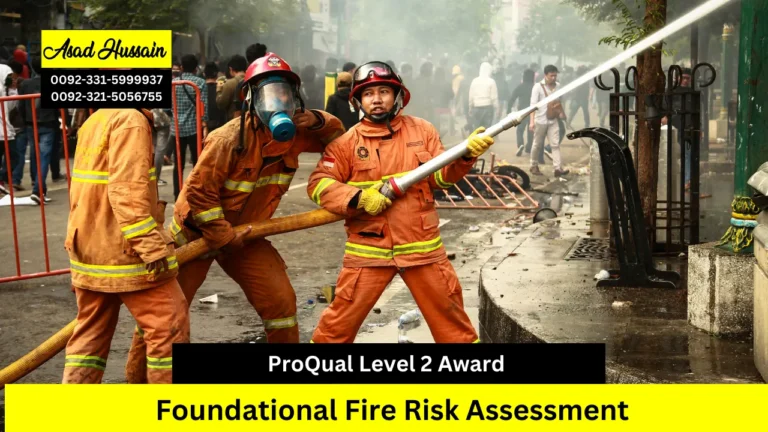The ProQual Level 6 Diploma in Hostile Environment Operations & Close Quarter Battle is therefore the premier credential for operatives and leaders in this specialized field. Achieving this diploma provides demonstrable, certified proof of an individual’s capability to perform at the highest level of operational readiness, ensuring they possess the integrated tactical and strategic judgement demanded by roles in close protection, special operations support, and high-risk environment management.
This high-level professional diploma certifies advanced, operational competencies for personnel operating in or managing teams within extreme-risk environments. It focuses on the strategic integration of tactical skills, dynamic risk assessment, and mission command principles required to navigate and survive direct threats. The curriculum is rooted in real-world scenarios, preparing candidates to make critical decisions under pressure while leading teams through complex and volatile situations where conventional security frameworks are absent.
Participants will master a comprehensive skill set encompassing advanced firearms handling, tactical combat casualty care (TCCC), surveillance and counter-surveillance, and the planning and execution of protective operations in denied areas. The programme emphasizes the legal and ethical frameworks governing the use of force, alongside sophisticated communication and leadership strategies essential for maintaining team cohesion and operational effectiveness in high-stress, ambiguous circumstances. This qualification is designed to validate not just physical proficiency, but the cognitive and leadership abilities required for high-stakes roles.
Program Highlights
The ProQual Level 6 NVQ Diploma in Construction Site Management (Construction), candidates must complete ALL of the Mandatory units (Total qualification time 1720 hours), plus the Mandatory/Optional requirements from one of the Pathways:
- Pathway 1: Building and Civil Engineering
- Pathway 2: Highways and Maintenance Repair
- Pathway 3: Residential Development
- Pathway 4: Conservation
- Pathway 5: Demolition
Mandatory Units
Mandatory Units – candidates must complete ALL units in this group
| Unit Title | Unit Level | Credit Value |
| Developing and Maintaining Good Occupational Working Relationships in the Workplace | 5 | 8 |
| Allocating Work and Checking People’s Performance in the Workplace | 5 | 9 |
| Establishing, Implementing and Maintaining Systems for Managing Health, Safety and Welfare in the Workplace | 6 | 15 |
| Evaluating and Selecting Work Methods to Meet Project or Operational Requirements in the Workplace | 6 | 11 |
| Monitoring Construction Related Project Activities in the Workplace | 6 | 8 |
| Controlling Project Progress Against Agreed Quality Standards in the Workplace | 6 | 10 |
| Controlling Project Progress Against Agreed Programmes in the Workplace | 6 | 11 |
| Managing Personal Development in a Construction-related Workplace | 6 | 8 |
Pathway 1: Building and Civil Engineering
| Unit Title | Unit Level | Credit Value |
| Contributing to the Identification of Work Teams in the Workplace | 5 | 8 |
| Establishing, Controlling and Monitoring Environmental Factors and Sustainability in the Workplace | 6 | 15 |
| Planning the Preparation of the Site for the Project or Operation in the Workplace | 6 | 11 |
| Ensuring that Work Activities and Resources Meet Project Work Requirements in the Workplace | 6 | 11 |
| Identifying, Allocating and Planning the Deployment and Use of Plant, Equipment or Machinery in the Workplace | 5 | 9 |
| Organising, Controlling and Monitoring Supplies of Materials in the Workplace | 5 | 8 |
| Establishing and Monitoring Communication Systems and Organisational Procedures in the Workplace | 6 | 11 |
| Establishing Project Dimensional Control Criteria in the Workplace | 6 | 10 |
| Controlling Project Quantities and Costs in the Workplace | 6 | 12 |
| Evaluating Feedback Information and Recommending Improvements in the Workplace | 6 | 7 |
| Identifying and Enabling Learning Opportunities for Given Work Teams in the Workplace | 4 | 7 |
Pathway 2: Highways and Maintenance Repair
| Unit Title | Unit Level | Credit Value |
| Contributing to the Identification of Work Teams in the Workplace | 5 | 8 |
| Planning Highways Maintenance or Repair Activities in the Workplace | 6 | 12 |
| Providing and Monitoring Construction-related Customer Service in the Workplace | 5 | 8 |
| Ensuring that Work Activities and Resources Meet project Work Requirements in the Workplace | 6 | 11 |
| Identifying, Allocating and Planning the Deployment and Use of Plant, Equipment or Machinery in the Workplace | 5 | 9 |
| Organising, Controlling and Monitoring Supplies of Materials in the Workplace | 5 | 8 |
| Controlling Project Quantities and Costs in the Workplace | 6 | 12 |
| Identifying and Enabling Learning Opportunities for Given Work Teams in the Workplace | 4 | 7 |
Optional Units – candidates must complete two units
| Unit Title | Unit Level | Credit Value |
| Establishing, Controlling and Monitoring Environmental Factors and Sustainability in the Workplace | 6 | 15 |
| Planning the Preparation of the Site for the Project or Operation in the Workplace | 6 | 1 |
| Establishing and Monitoring Communication Systems and Organisational Procedures in the Workplace | 6 | 11 |
| Establishing Project Dimensional Control Criteria in the Workplace | 6 | 10 |
| Evaluating Feedback Information and Recommending Improvements in the Workplace | 6 | 7 |
| Managing the Handover of the Construction Project in the Workplace | 6 | 10 |
Pathway 3: Residential Development
Mandatory units – candidates must complete all units
| Unit Title | Unit Level | Credit Value |
| Providing and Monitoring Construction-related Customer Service in the Workplace | 5 | 8 |
| Establishing, Controlling and Monitoring Environmental Factors and Sustainability in the Workplace | 6 | 15 |
| Planning the Preparation of the Site for the Project or Operation in the Workplace | 6 | 11 |
| Ensuring that Work Activities and Resources Meet Project Work Requirements in the Workplace | 6 | 11 |
| Organising Controlling and Monitoring Supplies of Materials in the Workplace | 5 | 8 |
| Establishing and Monitoring Communication Systems and Organisational Procedures in the Workplace | 6 | 11 |
| Establishing Project Dimensional Control Criteria in the Workplace | 6 | 10 |
| Evaluating Feedback Information and Recommending Improvements in the Workplace | 6 | 7 |
| Planning and Scheduling the Maintenance or Remedial Activities of Property, Systems or Services in the Workplace | 6 | 15 |
| Managing the Handover of the Construction Project in the Workplace | 6 | 10 |
| Identifying and Enabling Learning Opportunities for Given Work Teams in the Workplace | 4 | 20 |
Optional Units – candidates must complete one unit
| Unit Title | Unit Level | Credit Value |
| Contributing to the Identification of Work Teams in the Workplace | 5 | 8 |
| Identifying, Allocating and Planning the Deployment and Use of Plant, Equipment or Machinery in the Workplace | 5 | 9 |
| Controlling Project Quantities and Costs in the Workplace | 6 | 12 |
Pathway 4: Conservation
Mandatory Units – candidates must complete all units
| Unit Title | Unit Level | Credit Value |
| Planning Historical Conservation/Restoration Activities in the Workplace | 6 | 12 |
| Ensuring that Work Activities and Resources Meet Project Work Requirements in the Workplace | 6 | 11 |
| Identifying, Allocating and Planning the Deployment and Use of Plant, Equipment or Machinery in the Workplace | 5 | 9 |
| Organising, Controlling and Monitoring Supplies of Materials in the Workplace | 5 | 8 |
| Establishing and Monitoring Communication Systems and Organisational Procedures in the Workplace | 6 | 11 |
| Establishing Project Dimensional Control Criteria in the Workplace | 6 | 10 |
| Controlling Project Quantities and Costs in the Workplace | 6 | 12 |
| Planning and Scheduling the Maintenance or Remedial Activities of Property, Systems or Services in the Workplace | 6 | 15 |
| Identifying and Enabling Learning Opportunities for Given Work Teams in the Workplace | 4 | 7 |
Optional Units – candidates must complete two units
| Unit Title | Unit Level | Credit Value |
| Contributing to the Identification of Work Teams in the Workplace | 5 | 8 |
| Providing and Monitoring Construction-related Customer Service in the Workplace | 5 | 8 |
| Establishing, Controlling and Monitoring Environmental Factors and Sustainability in the Workplace | 6 | 15 |
| Planning the Preparation of the Sit for the Project or Operation in the Workplace | 6 | 11 |
| Evaluating Feedback Information and Recommending Improvements in the Workplace | 6 | 7 |
| Managing the Handover of the Construction Project in the Workplace | 6 | 10 |
Pathway 5: Demolition
Mandatory Units – candidates must complete all units
| Unit Title | Unit Level | Credit Value |
| Planning Demolition Activities in the Workplace | 6 | 12 |
| Establishing, Controlling and Monitoring Environmental Factors and Sustainability in the Workplace | 6 | 15 |
| Planning the Preparation of the Site for the Project or Operation in the Workplace | 6 | 11 |
| Ensuring that Work Activities and Resources Meet Project Work Requirements in the Workplace | 6 | 11 |
| Identifying, Allocating and Planning the Deployment and Use of Plant, Equipment or Machinery in the Workplace | 5 | 9 |
| Managing the Handover of the Construction Project in the Workplace | 6 | 10 |
Optional Units – candidates must complete four units
| Unit Title | Unit Level | Credit Value |
| Contributing to the Identification of Work Teams in the Workplace | 5 | 8 |
| Providing and Monitoring Construction-related Customer Service in the Workplace | 5 | 8 |
| Organising, Controlling and Monitoring Supplies of Materials in the Workplace | 5 | 8 |
| Establishing and Monitoring Communication Systems and Organisational Procedures in the Workplace | 6 | 11 |
| Controlling Project Quantities and Costs in the Workplace | 6 | 12 |
| Identifying and Enabling Learning Opportunities for Given Work Teams in the Workplace | 4 | 7 |
Entry Requirements
This advanced operational diploma is designed for seasoned professionals operating in extreme-risk sectors. To ensure candidates possess the requisite maturity, background, and physical/mental resilience, the following stringent requirements must be met:
- Age, Background Checks & Medical Fitness: Applicants must be at least 21 years of age, must pass enhanced background and vetting checks, and must provide a current, comprehensive medical certificate confirming they are physically and psychologically fit for high-stress tactical training.
- Professional & Operational Experience: Candidates must have verifiable, substantial prior professional experience in a relevant field such as military, law enforcement, close protection, or government security services, with documented exposure to operational environments.
- Language Proficiency & Cognitive Capacity: Exceptional written and verbal English language skills are mandatory to understand complex briefs, operate sophisticated equipment, and adhere to strict rules of engagement. The ability to quickly assimilate and act on detailed information under extreme pressure is essential.
- Supporting Your Application: A background evidenced by prior formal training is critical. This includes certifications in close protection (SIA or military equivalent), tactical firearms, defensive driving, advanced first aid (e.g., TCCC/TECC), or relevant military/Police specialist qualifications.
All applications undergo a rigorous suitability assessment. Final acceptance is contingent not only on meeting these criteria but also on successful completion of a pre-course fitness test and a practical skills evaluation to ensure baseline operational readiness.
Learning Outcomes
Upon successful completion of the ProQual Level 6 Diploma, participants will be able to:
- Conduct Comprehensive Risk Assessments:
Evaluate potential threats and vulnerabilities in hostile environments, developing effective strategies to mitigate risks. - Apply Advanced Close Quarter Battle Techniques:
Demonstrate proficiency in CQB tactics, including engagement strategies, weapon handling, and movement in confined spaces. - Demonstrate Leadership in High-Stress Situations:
Lead teams effectively during hostile operations, making informed decisions under pressure and ensuring the safety of all personnel. - Adapt Tactical Strategies to Changing Conditions:
Modify operational plans and tactics based on evolving circumstances and real-time intelligence during missions. - Implement Operational Security Protocols:
Establish and maintain measures to protect personnel, equipment, and information during operations in high-risk environments. - Respond Effectively to Emergencies:
Execute emergency response protocols, including first aid and crisis management, to address injuries and incidents promptly. - Enhance Situational Awareness:
Develop heightened awareness of the operational environment, enabling proactive identification of potential threats. - Evaluate Post-Operation Performance:
Conduct debriefs and assessments following operations to identify lessons learned and areas for improvement in future missions.
These learning outcomes equip participants with the skills and knowledge necessary to excel in high-stakes operational roles, enhancing their effectiveness and professionalism in hostile environments.
Target Audiences
This advanced-level diploma is designed for elite professionals whose roles demand the highest standard of tactical proficiency and strategic judgement in life-threatening situations. It is a critical qualification for:
- High-Risk Close Protection Operatives & Team Leaders: Specialists tasked with protecting clients in extreme threat environments, including hostile regions, conflict zones, or areas of elevated kidnap risk, who require certified advanced tactical skills.
- Military & Law Enforcement Specialists: Personnel from special operations units, reconnaissance teams, or tactical law enforcement who are transitioning into private sector roles or require formal validation of their advanced combat and survival skills for specific deployments.
- Security Consultants & Risk Managers for Hostile Regions: Advisors and managers who plan and lead operations in denied areas, requiring a certified, hands-on understanding of tactical realities to conduct effective risk assessments, manage teams, and ensure operational duty of care.
Ultimately, this Level 6 Diploma is for the definitive operational professionals, providing the certified benchmark of competency for those who must navigate, survive, and operate effectively at the very edge of tactical possibility.







